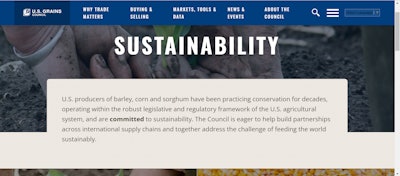
Sustainability has become a crucial aspect of agricultural practices worldwide. The U.S. Grains Council (USGC), a prominent organization dedicated to developing export markets for U.S. grains, has recently launched four new web pages that focus on their sustainability efforts. These web pages aim to provide valuable information and resources about sustainable practices and technologies employed by U.S. farms and agribusinesses.
The Importance of Sustainability in Agriculture
Sustainability in agriculture plays a vital role in ensuring the long-term viability of farming practices while minimizing the impact on the environment. It encompasses various aspects, including environmental stewardship, economic viability, and social responsibility. By adopting sustainable practices, farmers and agribusinesses contribute to global food security and climate-smart international supply chains.
The USGC recognizes the significance of sustainability and its impact on the global agricultural industry. The organization serves as a bridge between national and international stakeholders, facilitating collaboration to achieve sustainability goals. The USGC's commitment to sustainability is evident in their efforts to increase the volumes of sustainably-produced U.S. grains reaching international markets.
The USGC's sustainability efforts focus on three key commodities: corn, sorghum, and barley. Each commodity has its own set of sustainability challenges and opportunities. By understanding these challenges and working towards solutions, the USGC aims to ensure the long-term sustainability of these commodities in the global market.
- Corn sustainability: Corn is a versatile and widely grown crop in the United States, with numerous applications in the food, feed, and fuel industries. The USGC recognizes the need for sustainable corn production practices to meet the growing global demand. They actively support the climate goals established by organizations representing corn products and collaborate with stakeholders to implement sustainable production methods.
- Sorghum sustainability: Sorghum is another important crop represented by the USGC. It is known for its resilience and ability to thrive in diverse climates. The USGC is committed to promoting sustainable sorghum production practices that enhance environmental stewardship and ensure the economic well-being of sorghum farmers. Through their initiatives, the USGC aims to strengthen the sustainability of sorghum supply chains.
- Barley sustainability: Barley, a grain widely used in brewing and animal feed, is another focus area for the USGC's sustainability efforts. The organization works closely with barley farmers to showcase their journey in adopting sustainable production practices. By aligning with international supply chain requirements related to sustainability, the USGC helps barley farmers enhance their market access and contribute to sustainable global supply chains.
Collaborative Approach to Sustainability
The USGC understands that achieving sustainability goals requires collaboration among various stakeholders, both nationally and internationally. They actively engage with member organizations, sister organizations, and international stakeholders to address sustainability challenges collectively. By serving as a facilitator, the USGC helps foster collaboration and knowledge exchange to promote sustainable practices throughout the agricultural industry.
The USGC's newly launched web pages provide a wealth of information and resources on sustainability in the agriculture industry. The main web page highlights the Council's overall commitment to sustainability before delving into the specifics of sustainability practices for corn, sorghum, and barley.












